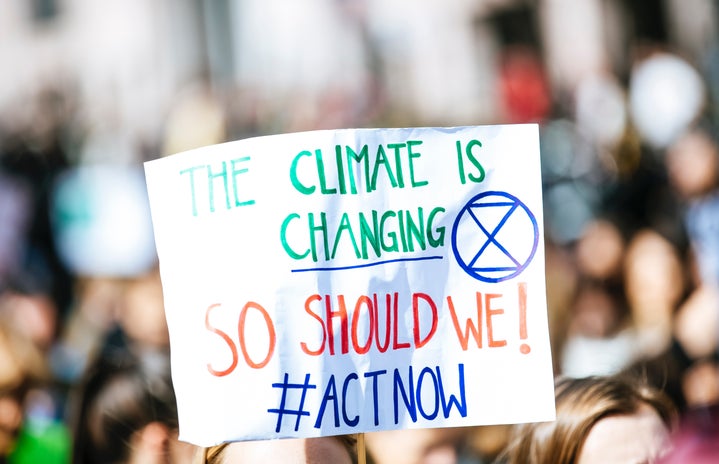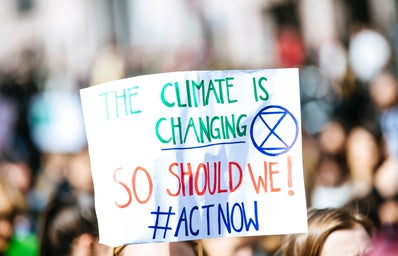The article below was written by Júlia Girão and edited by Marina Fornazieri. Liked this type of content? Check out Her Campus Cásper Líbero for more!
When it comes to International Conferences, such as the Conference of the Parties (COP´S) or the UN General Assembly (UNGA), Brazil always had a significant role – with a respectable history in said discussions. However, since Bolsonaro took place as head of state with an anti-environmental policy, the situation has changed, and Brazil´s role in this area has dissolved.
The United Nations Climate Change Conference 2021 (COP26) took place from October 31st to November 12th in Glasgow, UK. It is the largest and most relevant climate conference in the world. On this occasion, almost 200 countries gathered to discuss the global climate emergency we live in. Bolsonaro did not attend.
Numerous additions to the United Nations Framework Convention on Climate Change (UNFCCC) treaty were negotiated during the COPs, to assert legal limits on gas emissions for each country. In this case, COP26 had a new interest: establish that countries should complete the “Paris Regulation”, which is the rules imposed by the Paris Agreement, and the nations that are part of it should contribute to the decrease of 1.5°C in the world’s temperatures.
It is impossible to control global climate changes without Brazil’s participation and contribution. Therefore, due to the great ecological heritage in its territory, the responsibility and contribution necessary increases in climate conferences. However, at the moment, the country’s climate situation has never been worse. And even on this occasion, Bolsonaro didn’t even bother to show up.
COP26: Bolsonaro’s escape
Due to “agenda reasons”, Bolsonaro did not attend Glasgow. The “strategy” of avoiding debates is traditional for the president; it was carried this way throughout his whole campaign in 2018 and in other international conferences, such as the former COP (2019 in Madrid), which he also did not attend.
In the COP26, Brazil was represented by Joaquim Leite, minister of the environment, who presented major goals for the country: “Today we present a new, more ambitious climate target, going from 43% to 50% by 2030; and a carbon-neutral target by 2050, which will be formalized during COP26”.
The president sent a short video, shown just before the minister’s speech.
In it, Bolsonaro affirmed that Brazil is part of the solution and not the problem and that the country would consolidate as a leading green economy. Besides that, he said that the federal government has large lines of credit and investments to encourage the environment. However, since 2019, the Amazon Fund (one of the largest international cooperation projects for the Amazon Rainforest) has stopped.
During COP15, in 2009, former president Lula simply attended the event. Not only that, Brazil presented the boldest proposal among countries in that year: reduce greenhouse gas emissions from 26% to 38.98%. Also aimed to induce developed countries that did not sign the Kyoto Protocol to assume the target in the same way.
The Glasgow Climate Pact recognizes the global climate emergency. After intense negotiation and a change requested by India at the last minute, the final text of COP26 was approved by nearly 200 member countries
For the first time, the document foresees a gradual reduction in the use of fuels and coal. Brazil may have difficulties in actually complying with this commitment, due to the decisions of the Bolsonaro government and the country’s electrical history. Still, the text is not unanimous.
UN General Assembly: Lies and lies
The General Assembly of the United Nations (UN) has been held annually since 1945, in New York. It is where all Member States of the Organization gather to discuss agendas that affect all nations. Traditionally, Brazil opens the Assembly. In September, it was Jair Bolsonaro’s turn to speak at the 76th edition of the event. In his speech, about 11 false allegations were identified during the 12-minute and 10-second period.
After walking around New York claiming not to be vaccinated, he lied about the recent manifestations on the September 7 holiday, saying that millions went to the streets. However, the estimate of the Secretariat of Public Security of São Paulo indicates that 125,000 people attended the event. He also defended numerous times, the so-called “early treatment” against COVID-19, which it’s already proven to be ineffective against the virus.
Regarding the environment, Bolsonaro guaranteed that 14% of the Brazilian territory is destined to indigenous reserves and stated that deforestation in the Amazon decreased by 32%. However, according to Imazon ((Institute of People and the Environment of the Amazon), deforestation increased by 7%.
Former president and responsible for the Real Plan, Fernando Henrique Cardoso, opened the UN General Assembly, in 2001. With an in-depth speech highlighting the terrorist attacks that took place that year, he did something that seems impossible to Bolsonaro: he didn’t lie, he didn’t make jokes, and he took his position seriously.
In 2011, former president Dilma Rousseff became the first woman to open the stage of speeches by heads of state in the Assembly. Despite constant criticism of her way of conducting speeches, Dilma’s speech made history after highlighting the importance of women in politics and defending the participation of emerging countries in world forums.
impacts of Bolsonaro´s posture
Since Bolsonaro assumed the presidency and the COVID-19 pandemic took place, denial statements by the “head of state” almost daily, the country’s image has only declined thanks to his posture. The president’s disdain for any humanitarian or environmental cause puts the country in an extremely difficult situation.
Brazil has always had a major role and respect in major negotiations, such as the Green Fund, which took place during Dilma’s presidency. Now, every international event loses chances of benefiting from policies and resources, which has already affected sustainable development, income generation, and quality of life, for example. Even during the G20 summit, which took place a few weeks ago, Bolsonaro was isolated by other world leaders.


